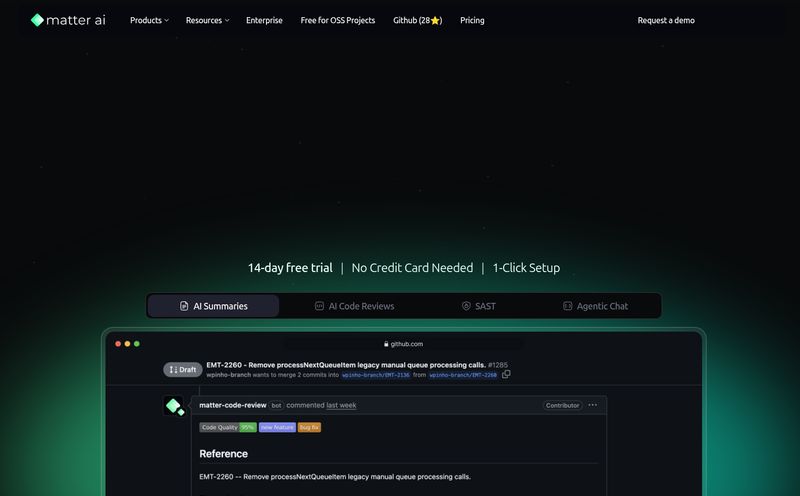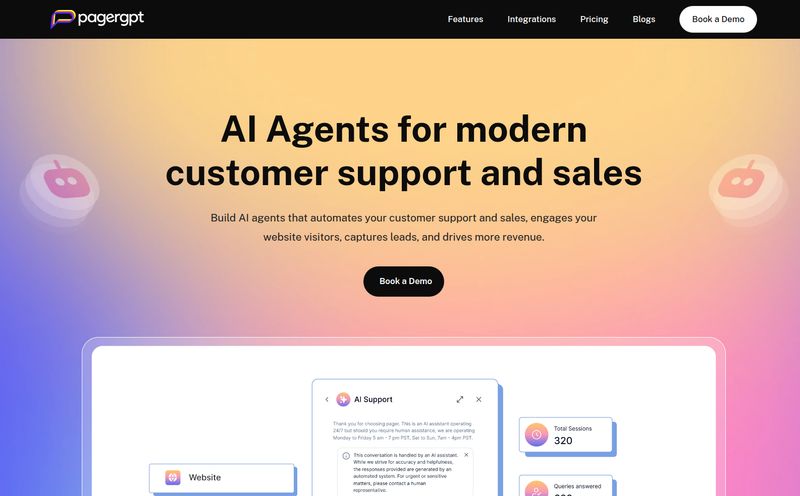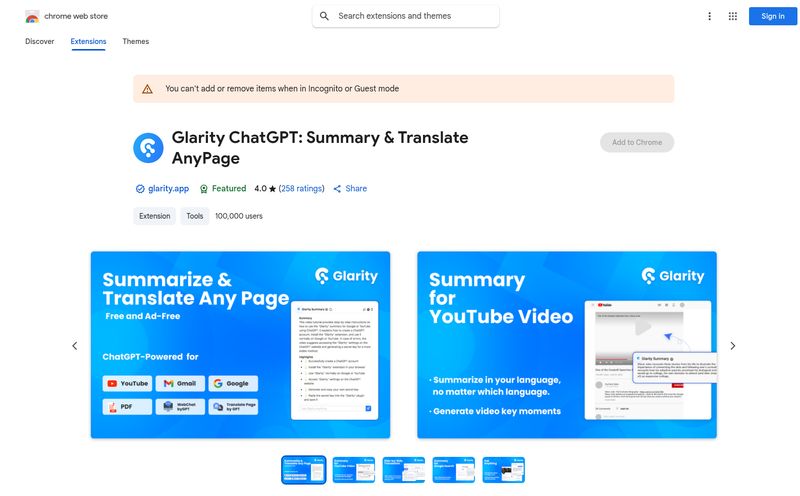As developers, we spend an embarrassing amount of time on Google and Stack Overflow. It’s a professional rite of passage. You hit a bug, you copy-paste the error message, and you pray someone, somewhere, in 2014 had the exact same problem and a kind soul posted the solution. But the ground is shifting under our feet. The AI hype train has left the station, and now we have tools that promise to answer our questions directly. Most of them are… okay. They’re like a very confident intern; they’ll give you an answer, but you better double-check their work.
So, when I first heard about Devv AI, I was skeptical. Another AI wrapper? Another tool promising to revolutionize my workflow? Yawn. But then I started digging in, and I have to admit, my cynicism started to fade. This one feels different. It’s not just a chatbot with a fancy UI; it feels like it was built by developers, for developers, who are tired of the same old song and dance. It’s an AI search engine that actually understands our world.
So, What Exactly Is Devv AI?
In a nutshell, Devv AI is a specialized search engine that combines the power of large language models (LLMs) with real-time, developer-centric data. Think about it. When you ask ChatGPT a coding question, it draws from a static, general-purpose dataset. It doesn't know about that new library version that dropped yesterday, or the obscure-but-critical GitHub issue that was just closed.
Devv AI tries to fix this. It’s like having a senior developer who has read every recent post on Stack Overflow, every relevant GitHub repository, and all the latest DevDocs, and can synthesize all that information into a coherent answer for you. It’s not just spitting back information; it’s providing answers with context. And in development, context is everything.

Visit Devv AI
The Different Flavors of Devv: Exploring the Modes
Devv AI isn’t a one-trick pony. It splits its functionality into a few different modes, which I found surprisingly useful for different stages of a problem.
GitHub Mode: Your Personal Code Whisperer
Okay, this is the one that really got my attention. You can point Devv AI at a public GitHub repository, let it do its thing, and then ask it questions about that specific codebase. Anyone who's ever had to parachute into a massive, poorly documented legacy project knows how huge this is. Instead of spending days just trying to figure out where the `processPayment` function lives and what it connects to, you can just… ask.
I tried this on an open-source project I contribute to, and it was pretty mind-blowing. “Where are the environment variables configured for the database connection?” Boom. Direct answer with code snippets. “Explain the purpose of the `AuthService` class.” It gave me a surprisingly accurate summary. It’s less of a search bar and more of a compass for navigating the dense jungle of a new codebase. A quick heads-up though, it’s still working on full support for private repos, which is a bit of a bummer for enterprise work, but they say its in development. I'm watching that one closely.
Web Mode: Cutting Through the Online Clutter
This is your go-to for general programming questions. The key difference between this and just Googling it is the sourcing. Devv AI’s Web Mode focuses on pulling from trusted, up-to-date developer haunts. It's designed to avoid those frustrating moments where you find a perfect solution, only to realize it's for a version of a framework that’s five years out of date. It’s a curated, intelligent search that respects your time. A very welcome change, if you ask me.
Chat Mode: The Familiar AI Playground
This is the most straightforward mode, functioning like the AI chat interfaces we’ve all gotten used to. But with a fantastic twist: you can choose your model. You’re not locked into one ecosystem. You can toggle between different models from OpenAI (GPT-3.5, GPT-4), Anthropic (Claude Haiku, Sonnet, Opus), and Google (Gemini). As someone who finds different models excel at different tasks, this is a massive win. Sometimes I need the raw logical power of GPT-4 for a complex algorithm; other times, Claude’s more nuanced, verbose style is better for documentation. Having that choice in one place is just brilliant.
My Experience: The Good, The Bad, and The Code
After playing with it for a couple of weeks, Devv AI has genuinely earned a spot in my bookmarks bar. The combination of real-time data and the contextual awareness of the GitHub mode is a killer feature. It's saved me hours of what I call “code archaeology”—digging through layers of old code to understand how things work.
That said, it’s not perfect. Nothing ever is. When I pointed it at a particularly massive monorepo, the initial indexing took a while. I mean, go-make-a-coffee-and-walk-the-dog-a-while. It’s understandable, but something to be aware of. Also, the Pro plan’s limitation on Claude Opus (the most powerful Claude model) to just 10 queries a day is a little bit of a tease. I get it, those top-tier models are expensive to run, but a guy can dream, right? It’s a minor gripe in the grand scheme of things.
Let’s Talk Money: Devv AI Pricing
Pricing is always the elephant in the room. So how much does this magical coding assistant cost? The structure is refreshingly simple.
| Plan | Cost | Key Features |
|---|---|---|
| Free Tier | $0 / month | Unlimited access to GPT 3.5 and Claude Haiku. Access to all search modes. |
| Pro Tier | (Check website for current price) | Unlimited access to all models, except for a limit of 10 queries per day on Claude Opus. |
Honestly, the free tier is incredibly generous. Unlimited access to models as capable as GPT-3.5 and Claude Haiku is more than enough for many daily coding tasks, and it's a perfect way to see if the tool fits your workflow. The Pro Tier is for those who need the extra horsepower from models like GPT-4 on a regular basis. Plus, they have a student discount program, which is a fantastic move that shows a commitment to the next generation of developers.
Who Is This Tool Actually For?
I’ve been thinking about this, and I think Devv AI has a pretty broad appeal, but it really shines for a few key groups:
- Students and Junior Developers: It’s an incredible learning companion. Being able to ask questions and get answers in the context of a real codebase is an amazing way to learn best practices and understand complex systems.
- Senior Developers & Team Leads: It’s a massive productivity booster. The time saved on code discovery and debugging obscure issues translates directly into faster development cycles. It's the ultimate rubber duck that actually talks back with useful information.
- Open-Source Contributors: If you frequently jump between different open-source projects, the GitHub Mode is a godsend for getting up to speed quickly.
The Verdict: Is Devv AI Joining My Toolbox?
Yes. Absolutely. Without a doubt.
While I’m still going to be visiting Stack Overflow (old habits die hard), Devv AI has become my first stop. It’s not just another search tool; it's a thinking partner. It streamlines the most tedious parts of my job—the searching, the digging, the trying to decipher code written a decade ago—and lets me focus on the part I actually love: building cool stuff. The free tier is a no-brainer for anyone to try, and for professional developers, the pro plan feels less like an expense and more like an investment in your own sanity and productivity.
Frequently Asked Questions
How is Devv AI different from just using ChatGPT or Google?
The main difference is context and data source. Devv AI pulls real-time information from developer-specific sites like GitHub and Stack Overflow and can analyze entire code repositories, giving you much more accurate and relevant answers for coding problems than a general-purpose AI or a standard search engine.
Can Devv AI access my private GitHub repositories?
Not at the moment. Currently, the GitHub Mode works with public repositories. However, support for private repositories is a planned feature that the team is actively working on.
Is the free version of Devv AI actually good enough to use?
Absolutely. The free tier offers unlimited access to powerful models like GPT-3.5 and Claude Haiku, which is more than sufficient for many day-to-day programming questions and tasks. It's a fantastic way to get a feel for the platform's power.
Which AI model should I use in Devv AI?
It really depends on your task! As a rule of thumb, I use GPT-4 for complex logic or algorithm generation, Claude models for more nuanced explanations or documentation, and Gemini for a good balance of speed and capability. The best part is you can experiment and see which works best for you.
Does Devv AI replace Stack Overflow?
I'd say it complements it. Devv AI is excellent at synthesizing information from sources like Stack Overflow into a direct, easy-to-digest answer. You might not need to scroll through five different threads anymore, but the community knowledge on Stack Overflow is still part of what makes Devv AI so powerful.
Is there a student discount for Devv AI Pro?
Yes, there is! Devv AI offers a student discount program, making the Pro plan more accessible for those who are still learning the ropes.
Conclusion
We're in a strange and exciting time for software development. The tools are evolving at a breakneck pace, and it’s easy to get lost in the noise. But every now and then, a tool like Devv AI comes along that genuinely feels like a step forward. It’s not about replacing developers; it’s about augmenting them, taking the friction out of our work so we can be better, faster, and more creative. And that’s a future I’m pretty excited to code in.



